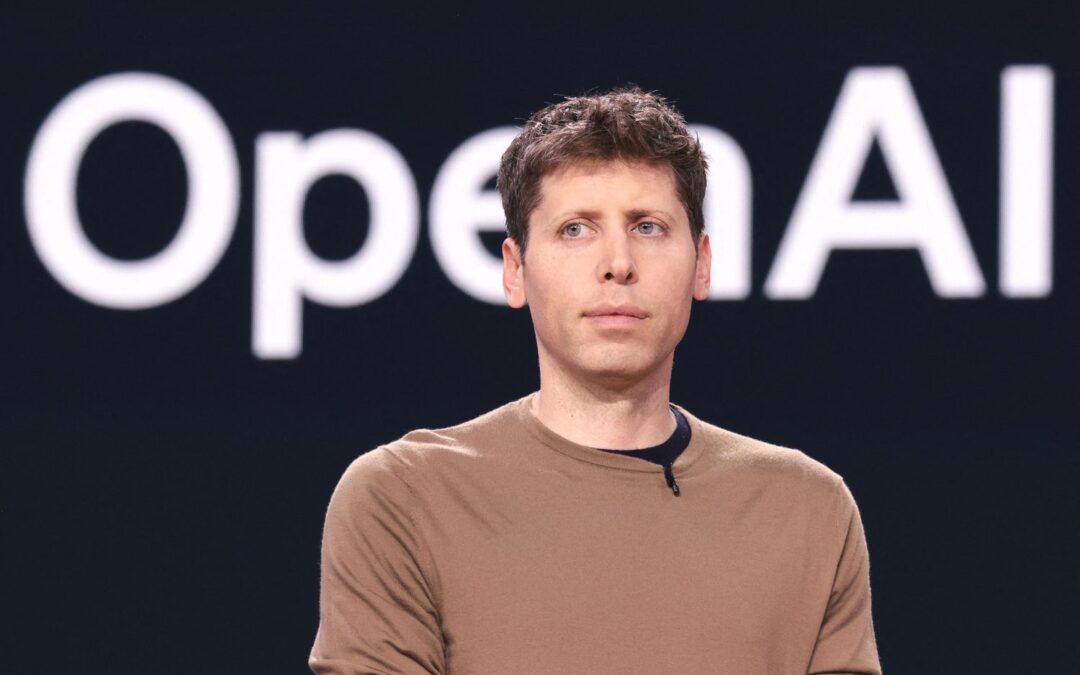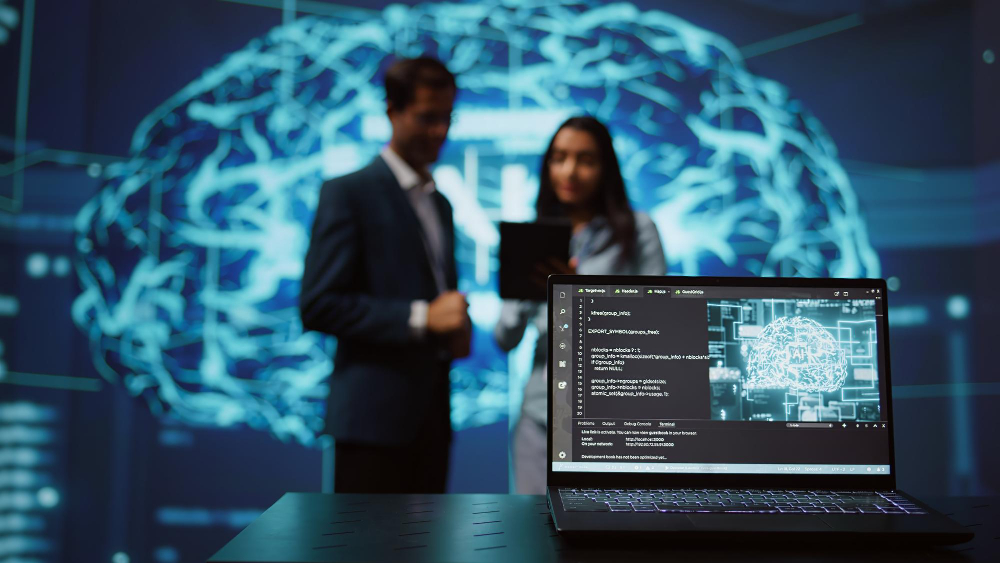
by Research Team from the Laboratory of the Future | Aug 5, 2025 | Artificial intelligence, The protagonists of IA
Birth and Early Years:
Samuel Harris Altman, known as Sam Altman, was born on April 22, 1985, in Chicago, Illinois, into a middle-class Jewish family. His mother, Connie Gibstine, was a dermatologist, and his father, Jerry Altman, a real estate broker, has passed away. He grew up in St. Louis, Missouri, where he showed early technological precocity: at eight years old, he received his first computer, an Apple Macintosh, with which he learned to program and dismantle devices. His adolescence was marked by his sexual orientation; at 16, he came out openly as gay, a courageous act within the conservative context of the American Midwest.
Academic Background and First Venture:
He studied at John Burroughs School and later entered Stanford University to study computer science. However, he dropped out in 2005 at the age of 19 to found Loopt, a pioneering mobile geolocation application that allowed users to share their real-time location. The startup received funding from Y Combinator and, although it did not achieve the massive success expected, it was sold in 2012 to Green Dot Corporation for $43.4 million.
Rise at Y Combinator:
After the sale of Loopt, Altman joined Y Combinator (YC), the prestigious startup accelerator, initially as a partner and later as its president in 2014. Under his leadership, YC expanded its reach, investing in companies such as Airbnb, Dropbox, and Stripe, and launched initiatives like YC Continuity (a $700 million fund) and YC Research, focused on projects related to basic income and urban futures. His vision transformed YC into a hub of innovation, solidifying his reputation in Silicon Valley.
OpenAI and the Artificial Intelligence Revolution:
In 2015, Altman co-founded OpenAI along with Elon Musk, Greg Brockman, and others, with the goal of developing artificial intelligence (AI) in a safe and beneficial way for humanity. As CEO since 2019, he has driven milestones such as the GPT-3, GPT-4, DALL-E, and ChatGPT models, the latter reaching 100 million users just two months after its launch. His focus on ethics and transparency led him to advocate for government regulation, comparing the risks of AI to those of nuclear energy.
In November 2023, Altman was abruptly dismissed as CEO of OpenAI for lack of transparency with the board of directors, but returned days later following massive employee support and a restructuring of the board. This episode reflected internal tensions regarding the company’s ethical and commercial direction, especially after Microsoft’s $10 billion investment.
Investments and Futuristic Vision:
Altman is a prominent investor in sectors such as nuclear energy (chairman of Helion Energy and Oklo), biotechnology (Retro Biosciences), and cryptocurrencies (Worldcoin). His portfolio includes companies like Reddit, Airbnb, and Stripe, and he has donated millions to projects such as Project Covalence during the COVID-19 pandemic. His philosophy combines radical technological optimism with apocalyptic pragmatism: he stores supplies for global crises and advocates preparedness for pandemics or energy collapses.
Personal Life and Controversies:
Altman is a vegetarian, practices meditation, and follows Buddhist teachings. In 2024, he married Oliver Mulherin, an Australian engineer, in a private ceremony in Hawaii. His life has not been free of controversy: in 2024, he faced accusations of unauthorized use of Scarlett Johansson’s voice in an AI project and lawsuits alleging sexual harassment from his sister Ann, which he denied. In addition, critics such as Geoffrey Hinton have accused him of prioritizing profits over safety in the development of artificial intelligence.
Legacy and Perspective:
Altman emerges as a polarizing figure: a visionary to some, a provocateur to others. His essays, such as “Moore’s Law for Everything,” propose that AI could redistribute global wealth, while his public statements blend humility (“ChatGPT is incredibly limited”) with an almost messianic confidence in technological progress. At 39, his influence spans from Silicon Valley to the halls of global power, where he advises political leaders on the future of Artificial Intelligence.
In summary, Sam Altman embodies the duality of contemporary innovation: an architect of tools that promise to transform humanity, yet whose risks demand constant vigilance. His biography, still unfolding, is a testament to how technology redefines not only industries but also the boundaries of ethics and power. These last two issues remain debatable, as in the case of Elon Musk.

by Research Team from the Laboratory of the Future | Mar 25, 2025 | Artificial intelligence
The pioneering AI company closed 2024 with an announcement that surprised the community. The tool is not yet available to the general public.
In November 2022, OpenAI amazed the world with the launch of ChatGPT, its renowned AI-powered chatbot. More than two years after this iconic development, the company has introduced O3, a new family of reasoning models that promise to further revolutionize the field of technology.
In detail, the company led by Sam Altman presented two versions of its latest algorithm: O3 Standard—designed to process large amounts of data and perform general tasks—and O3 Mini, which operates with a significantly smaller number of parameters and is ideal for more specific tasks. Thus, OpenAI’s latest advancement takes a step further in its attempt to achieve Artificial General Intelligence (AGI).
Launched on December 20, 2024, OpenAI’s new development has made remarkable progress in abstract reasoning, advanced mathematics, and programming, among other fields. O3 belongs to a new family of products based on ChatGPT which, unlike the renowned chatbot and its predecessor O1, invests more time—and money—in evaluating alternatives before generating a response for the user.
The ARC-AGI evaluation, designed to measure the progress of various tools on their path to becoming AGI, achieved a score of 87.5%, a performance comparable to that of a human. These evaluations include solving visual logic puzzles, which are simple for humans but challenging for computers.
Specifically, O3 also achieved outstanding results in software engineering and a Codeforces programming competition, ranking 175th worldwide. But the advancements don’t stop there: OpenAI’s new family impressed with exceptionally high results in a complex mathematics evaluation.
Despite high expectations, some critics in the AI industry consider the announcement exaggerated. This includes the creator of ARC-AGI himself, who pointed out that there are already much cheaper tools capable of scoring 80% on the same evaluation. The main challenge for O3 is generalizing its knowledge across different tasks.
For now, tech enthusiasts will have to wait to access OpenAI’s new flagship reasoning models. The company announced that security researchers can sign up for a waiting list to test the model, and the American firm expects to release its latest advancement to the public later, though it has not yet confirmed whether it will be offered for free or as a paid service.
What is Artificial General Intelligence?
Broadly speaking, Artificial General Intelligence is the next step for AI developers. These automatic systems are, in theory, capable of successfully performing any intellectual task that humans can.
In other words, AGI will have the ability to understand or learn any intellectual task that a human can perform. Simply put, it is a type of tool designed to mimic the cognitive abilities of the human brain.
Besides the main characteristics mentioned earlier, AGI systems also possess other features that distinguish them from the AI we know today. Among them are:
- Generalization Ability: AGI can transfer its learnings and skills from one field of knowledge to another. This enables it to adapt effectively to new and unforeseen situations.
- Common Sense Knowledge: AGI will also have broad knowledge about the world, including various areas such as facts, relationships, and social norms. This allows for deeper reasoning when making decisions.
Research and development of AGI require interdisciplinary collaboration between fields such as computer science, neuroscience, and cognitive psychology.
The Difference Between AGI and “Narrow” AI
Compared to current tools available to users, AGI presents a higher level of autonomy and a broader range of functions. While traditional AI is designed exclusively to solve specific tasks for which it was programmed, AGI would allow a machine to operate across a wide range of activities due to its ability to generalize and transfer knowledge from one area to another.
Currently, the field of AGI is still in an exploratory phase. However, the launch of O3 and the fierce competition among OpenAI, Google, and X, among others, hint at a near future where these types of tools become part of everyday life.

by Research Team from the Laboratory of the Future | Mar 22, 2025 | Artificial intelligence, Transhumanism
From the possibility of interacting with deceased individuals to managing digital legacies in wills using artificial intelligence, a new definition of death presents ethical, legal, and emotional challenges
If we can talk to our dead and truly believe they are “alive,” what differentiates life from death?
Imagine attending a funeral where the deceased person speaks directly to you, answering your questions and sharing memories. This happened at the funeral of Marina Smith, a Holocaust educator who passed away in 2022.
Thanks to an AI technology company called StoryFile, Smith appeared to interact naturally with her family and friends.
The system used pre-recorded responses combined with artificial intelligence to create a realistic interactive experience. This was not just a video; it was something closer to a real conversation, offering people a new way to feel connected to a loved one after their passing.
Life After Death:
Technology has already begun to change how people think about life after death. Several tech companies are helping individuals manage their digital lives after passing away. For example, Apple, Google, and Meta offer tools to allow a trusted person to access your online accounts when you die.
Microsoft has patented a system that can take a person’s digital data—such as text messages, emails, and social media posts—and use it to create a chatbot. This chatbot can respond in a way that sounds like the original person.
In South Korea, a group of companies took this idea even further. A documentary called Meeting You allowed a mother to reunite with her daughter through virtual reality. Using advanced digital imaging and voice technology, the mother could see and talk to her deceased daughter as if she were really there.
These examples may seem like science fiction, but they are real tools available today. As AI continues to improve, the possibility of creating digital versions of people after their death seems increasingly close.
Who Owns Your Digital Life?
Although the idea of a digital life after death is fascinating, it raises significant questions. For example, who owns your online accounts after you die?
This issue is already being debated in courts and governments worldwide. In the United States, nearly all states have passed laws allowing people to include digital accounts in their wills.
In Germany, courts ruled that Facebook had to grant a deceased person’s family access to their account, stating that digital accounts should be treated as inheritable assets, like a bank account or a house.
But many challenges remain. For example, what happens if your digital clone says or does something online that you never would have said or done in real life? Who is responsible for what your AI version does?
When a deepfake of actor Bruce Willis appeared in an advertisement without his permission, it sparked a debate about how digital clones of people can be controlled—or even exploited for profit.
Cost is another issue. While some basic tools for managing digital accounts after death are free, more advanced services can be expensive. Creating an AI version of yourself could cost thousands of dollars, meaning only wealthy individuals could afford to “live” digitally. This financial barrier raises important questions about whether digital immortality could create new forms of inequality.
Grief:
Losing someone is often painful, and in today’s world, many people turn to social media to feel connected to those they’ve lost. Research shows that a significant proportion of people maintain social media connections with deceased loved ones.
But this new form of grieving brings challenges. Unlike physical memories, such as photos or objects that fade over time, digital memories remain fresh and easily accessible. They can even appear unexpectedly on your social media, triggering emotions when you least expect it.
Some psychologists worry that staying connected to a digital presence might make it harder for people to move on. This is especially true as AI technology becomes more advanced. Imagine being able to chat with a digital version of a loved one that feels almost real. While this might seem comforting, it could make it even harder for someone to accept their loss and let go.
Cultural and Religious Views:
Different cultures and religions have unique perspectives on digital immortality. For example:
- The Vatican, the center of the Catholic Church, has stated that digital legacies must always respect human dignity.
- In Islamic traditions, scholars are discussing how digital remains fit into religious laws.
- In Japan, some Buddhist temples are offering digital cemeteries where families can preserve and interact with the digital footprints of their loved ones.
These examples show how technology is being shaped by different beliefs about life, death, and remembrance. They also highlight the challenges of blending these innovations with ancient cultural and religious traditions.
Planning Your Digital Legacy:
When you think about the future, you probably imagine what you want to achieve in life—not what will happen to your digital accounts when you die. But experts say it’s important to plan what to do with your digital assets: from social media profiles and email accounts to photos, online bank accounts, and even cryptocurrencies.
Adding digital assets to your will can help you decide how your accounts should be managed after your passing. You could leave instructions on who can access your accounts, what should be deleted, and whether you’d like to create a digital version of yourself.
You can even decide if your digital version should “die” after a certain time.
Like the pharaohs, we may be able to “live” eternally in the digital afterlife—or at least until the data centers last.
Here are steps you can take to control your digital legacy:
- Decide on your digital legacy. Reflect on whether creating a digital version of yourself aligns with your personal, cultural, or spiritual beliefs. Discuss your preferences with loved ones.
- Take inventory and plan what to do with your digital assets. Make a list of all digital accounts, content, and tools that represent your digital identity. Decide how they should be managed, preserved, or deleted.
- Choose a digital executor. Name a trusted and tech-savvy person to oversee your digital assets and fulfill your wishes. Clearly communicate your intentions.
- Ensure your will covers your digital identity and assets. Specify how they should be handled, including storage, use, and ethical considerations. Include legal and financial aspects in your plan.
- Prepare for ethical and emotional impacts. Consider how your digital legacy could affect your loved ones. Plan to prevent misuse, secure funds for long-term needs, and align your decisions with your values.
The New Pyramids:
Thousands of years ago, Egyptian pharaohs built pyramids to preserve their legacy. Today, our “digital pyramids” are much more advanced and widely available. They not only preserve memories but can continue to influence the world long after we are gone.
Patrick van Esch is an Associate Professor of Marketing at Kennesaw State University in the United States. His research focuses on artificial intelligence (AI) in marketing, consumer behavior, and digital transformation. He has published numerous studies on AI ethics, digital branding, and how businesses can leverage AI to enhance consumer engagement. In addition to his academic work, he has experience in business consulting and marketing strategy, helping organizations adapt to technological advancements in the digital age.
Yuanyuan (Gina) Cui is an Assistant Professor of Marketing at Northern Illinois University. Her research explores digital marketing, AI-driven consumer behavior, and branding strategies. She has published studies on the impact of AI in marketing and how businesses can use AI to influence consumer decision-making. With expertise in data analytics and AI applications in business, she provides insights into the evolving relationship between technology and marketing, focusing on ethical and strategic implications.i

by Research Team from the Laboratory of the Future | Mar 7, 2025 | News
The new edition of the largest tech event was held in Las Vegas. Thousands of major companies showcased their ideas and advancements.
A new edition of the Consumer Electronics Show (CES) took place in Las Vegas. The traditional tech industry event, where the innovations to be implemented in the upcoming year are presented, had Artificial Intelligence as the main star.
This event had its first edition in New York in 1967 and is organized by CTA, the Consumer Technology Association, a group that brings together nearly 1,400 tech companies in the United States. Some of its editions have presented great innovations such as 4K TVs or the first Xbox in 2001.
Among the tech presentations, LG Electronics grabbed attention when it announced that it would partner with Microsoft to use the latter’s AI in its consumer electronics products.
Both companies plan to collaborate on developing AI agents for various spaces that currently don’t have them, such as homes, hotels, offices, and vehicles. While LG has already collaborated with Microsoft on voice recognition and speech synthesis technologies, this would go further.
The goal is for the upcoming AI agents to surpass customer interaction and understanding through identifying their needs and preferences.
Televisions running the Google TV operating system will receive an update that will include the Gemini AI from the company. Additionally, it will feature a voice control system, Google Assistant.
They also announced that the software update will add more natural voice commands, improved content search, and deeper integration with the Google search engine and the YouTube video platform.
According to reports, this update will be launched by the end of 2025 and will allow users to have two-way conversations with third-party TVs. Users will also be able to search for content saved in Google folders to watch on TV.
Samsung, on the other hand, introduced its Vision AI. Just like its smartphones have Galaxy AI, its 2025 line of TVs will offer various AI-based tools; their new Smart TVs and Smart monitors will come with integrated Copilot.
“This partnership will allow users to explore a wide range of Copilot services, including personalized content recommendations,” the company said in a statement.
The feature allows the TV to adapt to each user’s preferences and transform the screen into “smart companions that enhance entertainment,” including Click to Search, which allows identifying and searching for information on any item displayed on screen.
It also includes real-time subtitles in any language for any content shown, generative wallpapers for users to personalize based on preferences, and other features that align with Samsung’s strategy to turn the TV into the smart home control center.
Qualcomm introduced new chips that will bring AI to personal computers
Qualcomm Inc. introduced its new chips, which will be responsible for running the latest Artificial Intelligence software, powering personal computers. They will cost only $600.
They also have their Snapdragon X platform, which features an 8-core Oryon central processor, a graphic component, and a dedicated AI chip. This will run the Copilot software and Microsoft Corp. In the coming months, various companies will offer computers with this mechanism.
Additionally, they stated that the goal is for this system to be part of nearly all smartphones produced and sold starting this year.
Chips that extend the life of smartphones and laptops
Intel, which was for decades the best chip manufacturer in the world, officially unveiled a range of chips that extend the battery life of various tech devices, mainly laptops but also smartphones.
According to reports, the new laptops based on the latest version of their Core Ultra processors will be released by the end of this month. These chips aim to primarily improve device performance.
Thus, computers, for example, will be able to use Microsoft’s Teams software for more than ten hours on a single charge. Depending on the range, Intel indicated that some could last up to 18 hours without being plugged into electricity.
TCL presented an AI robot
The Asian company TCL presented AI Me describe, a robot it described as the “first modular AI companion robot” in the world. From its appearance, it seems to be aimed at children, but the official description presents it as a versatile device.
“AI Me is a companion for smart living. It integrates an innovative design, realistic interaction, and powerful features. Capture and preserve meaningful moments with your family, turn your home into a place of comfort, and watch over your house for peace of mind. Additionally, it adapts to your habits to offer personalized and interactive experiences,” the company described.
It has a camera on its head to record videos and recognize objects in its surroundings, using the charms of artificial intelligence. Its mobility is manifested in small arms, its gaze, and it also has a small motorized base that allows it to move around the house autonomously.
A smart lamp that walks and responds to requests
The Japanese company Jizai developed this invention, describing it as a “general-purpose AI robot.” Its appearance is striking, as it resembles Pixar’s famous lamp but with six mechanical legs.
Due to these features, it can move around spaces and accompany users, offering various functions. The official description indicates that it “thinks and acts on its own.”
To achieve its functions, it has a camera that allows it to recognize its environment, as well as microphones to receive verbal commands, as if it were a virtual assistant, but with a body.

by Research Team from the Laboratory of the Future | Feb 20, 2025 | Artificial intelligence
David Game College, a private institution in central London, launched a pilot project about six months ago to prepare students for secondary education exams using artificial intelligence (AI) instead of teachers.
However, the initiative is viewed with caution by a researcher working in this technology.
The institution “monitors” how students learn in their courses and analyzes “information about their learning habits,” explains the school’s deputy director, John Dalton. “Artificial intelligence is going to transform education. There is no doubt about it,” adds Dalton.
So far, seven secondary students are part of the pilot project. In a small classroom, they have computers to access the program.
According to John Dalton, who is a biology teacher, AI can evaluate a student’s knowledge “more accurately than the average teacher” and allow for more personalized teaching. It can also help identify gaps in students’ learning.
Instead of teachers, the seven students have “educational coaches,” who are qualified as teachers but do not necessarily know the content of the different subjects.
Their role is more about guiding students in using AI systems. They also support them in acquiring less technical skills, such as debating ability.
British Prime Minister Keir Starmer committed in mid-January to making the United Kingdom the “world leader” in artificial intelligence. The Labour leader announced an action plan that should attract companies and investors and boost a declining economy.
The government claims that AI could help teachers organize their classes and also in grading exams.
“Aila,” the Lesson Assistant
The government has developed its own tool, a lesson assistant called “Aila,” adapted to the British school curriculum.
For Rose Luckin, a professor at University College London (UCL) who studies AI uses in education, the David Game College pilot project is a “unique case.”
But the professor questions AI’s ability to teach “everything in mathematics, English, biology, chemistry, and physics. I don’t want to be too negative because if we don’t try these tools, we won’t see how they work.”
Rose Luckin acknowledges that AI will “transform” the role of teachers, although it is still “impossible” to know in which direction.
The professor hopes that David Game College will assess whether AI “has a positive or negative impact.”
Massa Aldalate, a 15-year-old student, expresses a positive impression of the experience. “At first, I had doubts,” she says, sitting in the classroom. “But it’s much more efficient if you really want to finish your work,” adds the teenager, who says she does not miss the traditional classroom.
Regarding English classes, one of her favorite subjects, she thought the subject required having a teacher in front of her, but she admits the experience “worked.”
One of the two main teachers’ unions, the National Education Union, welcomed the government’s emphasis on training teachers in digital tools.
However, its general secretary, Daniel Kebede, stressed that this ambition must be translated into “significant investments” to equip institutions with the necessary technologies.
Rose Luckin points out that the David Game College program is “elitist,” with an annual cost of £27,000 (about $33,700), equivalent to an increase of £10,000 (about $12,500) compared to the average tuition cost in private schools in the UK.
Inequality in access to technology is also a “challenge” posed by AI, she concludes.
Collaboration by AFP Agency





